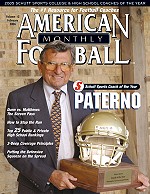AMERICAN FOOTBALL MONTHLY THE #1 RESOURCE FOR FOOTBALL COACHES
Article CategoriesAFM Magazine
|
A Winning Tradition: Lakeland\"s Bill Castleby: Richard Scott© More from this issue When you’ve been in coaching 36 years, 35 at the same school and 30 as the head coach, you see a lot of players and teams come and go. Some are more memorable than others. Some kids, some teams, some seasons, they all start to run together. Did that Smith kid play tackle or guard? Or was that his older brother? Was it the 1991 team or the 1992 team that was so fast? Was it the second state championship or the third state title that overcame all that adversity? Some teams and players are so unique, though, they stand out in a truly special way. For 60-year-old head coach Bill Castle, this season’s Lakeland (Fla.) High School football team will always stand out among the 35 teams that came before on Castle’s coaching path. The 2005 Lakeland High School team didn’t just win the Florida Class 5A state football cha....The full article can only be seen by subscribers. Subscribe today!
|
|
|||||||
| HOME |
MAGAZINE |
SUBSCRIBE | ONLINE COLUMNISTS | COACHING VIDEOS |
Copyright 2025, AmericanFootballMonthly.com
All Rights Reserved





